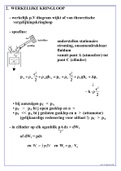Chapter 6 Process Design
What is process design?
To design is to conceive the looks, arrangement and workings of something before it is created.
Design is also an activity that can be approached at different levels of detail. At the start of the
process design activity it is important to understand the design objectives, especially when the
overall shape and nature of the process is being decided.
Process design and product/service design are interrelated
The design of services and products and the design of the processes that make them are
interrelated.
The overlap between the two design activities is generally greater in operations that produce
services.
The design of processes cannot be done independently of the services and/or products that are
being created.
Process networks
Any operation is both made up of networks (of processes) and a part of networks (of other
operations). It is essential in making all networks, including process networks, work effectively.
, Through this network there are many process chains (= threads of processes within the network).
Thinking about processes as part of a network has a number of advantages:
1. Understanding how and where a process fits into the internal network helps to establish
appropriate objectives for the process.
2. One can check to make sure that everyone in a process has a clear ‘line of sight’ forward
through to end customer.
3. A clear line of sight backwards through the operation’s suppliers makes the role and
importance of suppliers easier to understand.
4. Not understanding how process chains interact can reduce the effectiveness of the whole
operation and increase the risk of disruption spreading.
What should be the objectives of process design?
The whole point of process design is to make sure that the performance of the process is
appropriate for whatever it is trying to achieve. Some kind of logic should link what the operation as
a whole is attempting to achieve, and the performance objectives of its individual processes.
The design of any process should be judged on its quality, speed, dependability, flexibility, cost and
sustainability performance.
‘Micro’ process objectives
Operations performance objectives translate directly to process design objectives. Process design
also needs to consider a more ‘micro’ and detailed set of objectives. These are largely concerned
with flow through the process.
The time that a unit spends in the process (its throughput time) will be longer than the sum of all the
transforming activities that it passes through. Neither the items moving through the process, nor the
resources performing the activities may be fully utilized.
It is common for more micro performance flow objectives to be used that describe process flow
performance:
Throughput rate/flow rate: the rate at which items emerge from the process, i.e. the
number of items passing through the process per unit of time.
Cycle time: the time between items emerging from the process. The term ‘takt time’ is the
same, but is normally applied to ‘paced’ processes like moving belt assembly lines. It is the
‘beat’ or tempo of working required to meet demand.
Throughput time: the average elapsed time taken for inputs to move through the process
and become outputs.
‘Work-in-progress’/process inventory: the number of items in the process, as an average
over a period of time.
The utilization of process resources: the proportion of available time that the resources
within the process are performing useful work.
Standardization of processes
One of the most important process design objectives, especially in large organizations, concerns the
extent to which process designs should be standardized (= adopting a common sequence of
activities, methods and use of equipment). Standardizing processes can give some significant
advantages, but not every process can be standardized.
Allowing numerous ways of doing things causes confusion, misunderstandings and, eventually,
inefficiency.
What is process design?
To design is to conceive the looks, arrangement and workings of something before it is created.
Design is also an activity that can be approached at different levels of detail. At the start of the
process design activity it is important to understand the design objectives, especially when the
overall shape and nature of the process is being decided.
Process design and product/service design are interrelated
The design of services and products and the design of the processes that make them are
interrelated.
The overlap between the two design activities is generally greater in operations that produce
services.
The design of processes cannot be done independently of the services and/or products that are
being created.
Process networks
Any operation is both made up of networks (of processes) and a part of networks (of other
operations). It is essential in making all networks, including process networks, work effectively.
, Through this network there are many process chains (= threads of processes within the network).
Thinking about processes as part of a network has a number of advantages:
1. Understanding how and where a process fits into the internal network helps to establish
appropriate objectives for the process.
2. One can check to make sure that everyone in a process has a clear ‘line of sight’ forward
through to end customer.
3. A clear line of sight backwards through the operation’s suppliers makes the role and
importance of suppliers easier to understand.
4. Not understanding how process chains interact can reduce the effectiveness of the whole
operation and increase the risk of disruption spreading.
What should be the objectives of process design?
The whole point of process design is to make sure that the performance of the process is
appropriate for whatever it is trying to achieve. Some kind of logic should link what the operation as
a whole is attempting to achieve, and the performance objectives of its individual processes.
The design of any process should be judged on its quality, speed, dependability, flexibility, cost and
sustainability performance.
‘Micro’ process objectives
Operations performance objectives translate directly to process design objectives. Process design
also needs to consider a more ‘micro’ and detailed set of objectives. These are largely concerned
with flow through the process.
The time that a unit spends in the process (its throughput time) will be longer than the sum of all the
transforming activities that it passes through. Neither the items moving through the process, nor the
resources performing the activities may be fully utilized.
It is common for more micro performance flow objectives to be used that describe process flow
performance:
Throughput rate/flow rate: the rate at which items emerge from the process, i.e. the
number of items passing through the process per unit of time.
Cycle time: the time between items emerging from the process. The term ‘takt time’ is the
same, but is normally applied to ‘paced’ processes like moving belt assembly lines. It is the
‘beat’ or tempo of working required to meet demand.
Throughput time: the average elapsed time taken for inputs to move through the process
and become outputs.
‘Work-in-progress’/process inventory: the number of items in the process, as an average
over a period of time.
The utilization of process resources: the proportion of available time that the resources
within the process are performing useful work.
Standardization of processes
One of the most important process design objectives, especially in large organizations, concerns the
extent to which process designs should be standardized (= adopting a common sequence of
activities, methods and use of equipment). Standardizing processes can give some significant
advantages, but not every process can be standardized.
Allowing numerous ways of doing things causes confusion, misunderstandings and, eventually,
inefficiency.






